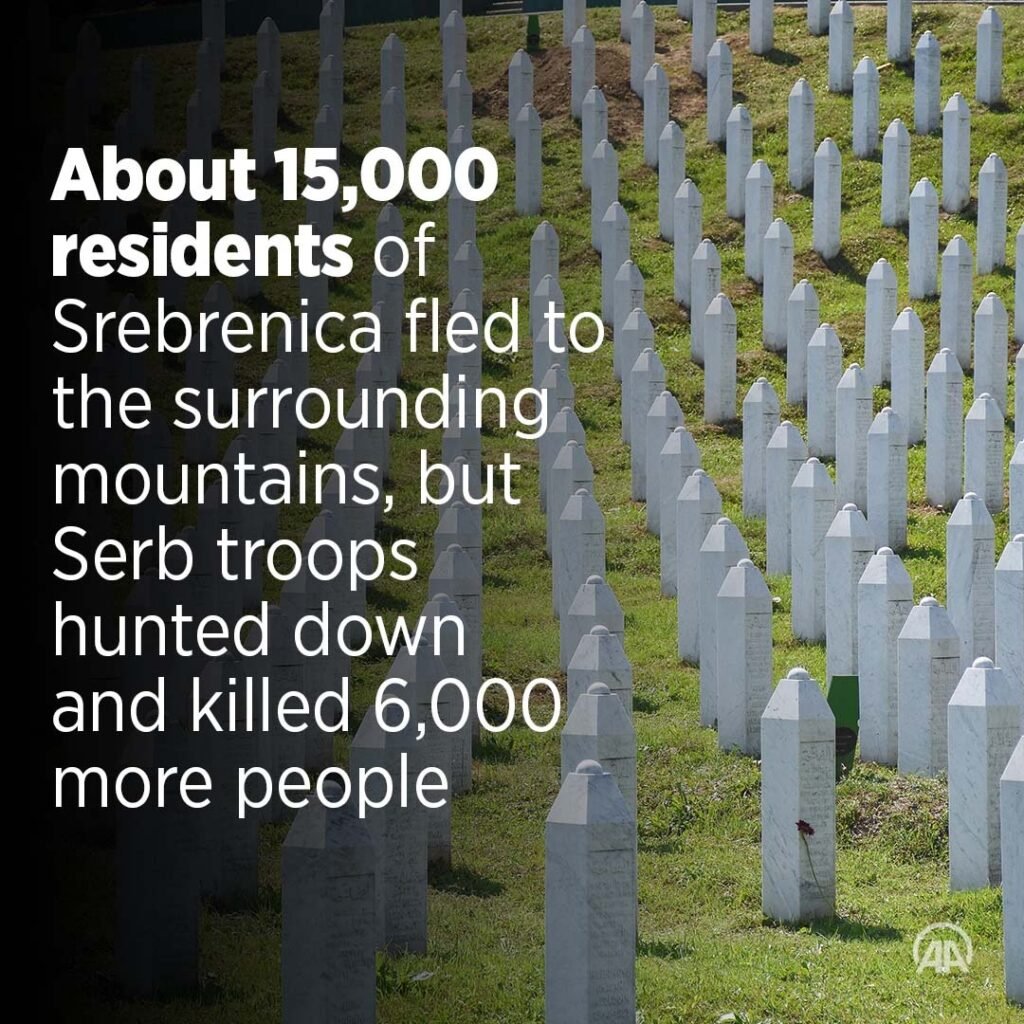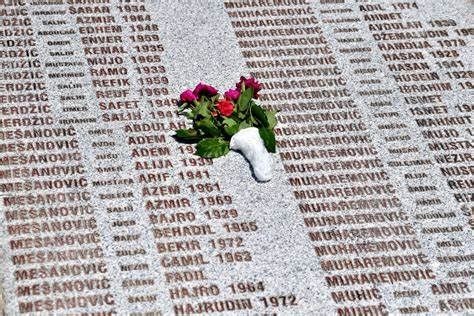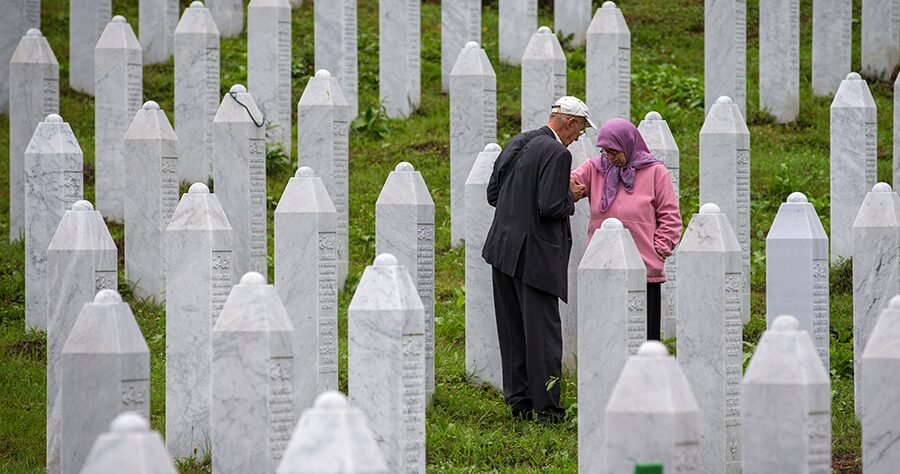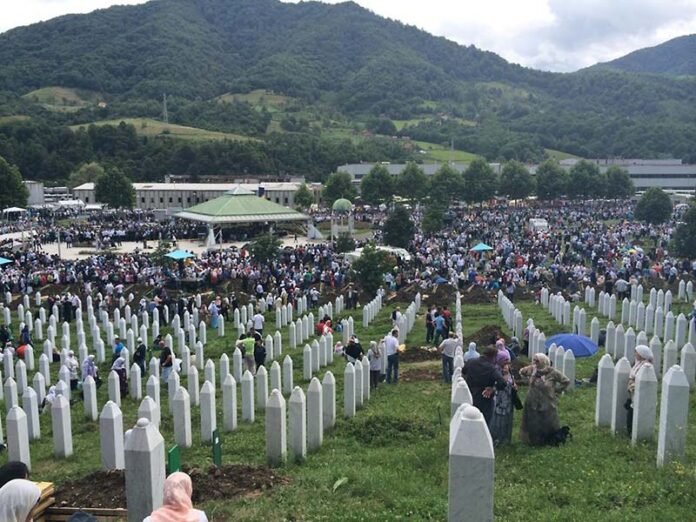Introduction
On July 11th, we solemnly observe the International Day of Reflection and Remembrance for the Srebrenica Genocide, marking the first global commemoration of this tragic event. This day serves as a poignant reminder of the atrocities that occurred in Srebrenica in 1995, where over 8,000 Bosnian Muslims were systematically murdered. It is a call to honor the victims, support the survivors, and reaffirm our commitment to justice and human rights.
The Srebrenica Genocide stands as one of the darkest chapters in recent history. The systematic execution of over 8,000 Bosnian Muslim men and boys by Bosnian Serb forces under the command of General Ratko Mladić has been classified as genocide by the International Criminal Tribunal for the former Yugoslavia (ICTY). This day of remembrance compels us to reflect on the magnitude of the loss and the enduring pain experienced by the survivors and the families of the victims.
Observing the International Day of Reflection and Remembrance for the Srebrenica Genocide is not only about commemorating the past but also about learning from it. It is an opportunity to educate younger generations about the importance of tolerance, unity, and human dignity. By remembering the Srebrenica Genocide, we strive to ensure that such atrocities are never repeated. The international community’s recognition of this day underscores a shared responsibility to uphold human rights and promote justice for all.
This commemoration is a profound reminder of the need for vigilance against hatred and intolerance in all its forms. It is a call to action to support initiatives that foster reconciliation and peace, and to stand in solidarity with those who continue to seek justice. As we reflect on the events of Srebrenica, we are reminded of the importance of compassion, empathy, and the collective duty to prevent future genocides.
Historical Context of the Srebrenica Genocide
The Srebrenica Genocide, which occurred in July 1995, stands as one of the most harrowing episodes of the Bosnian War (1992-1995). The town of Srebrenica, located in eastern Bosnia, was designated a ‘safe area’ by the United Nations in 1993. Despite this designation, it became the epicenter of a brutal massacre carried out by Bosnian Serb forces.
The Bosnian War was marked by ethnic strife among Bosnian Muslims (Bosniaks), Serbs, and Croats. The conflict stemmed from the disintegration of Yugoslavia and the ensuing power struggles among its former republics. As the war escalated, Srebrenica, predominantly populated by Bosniaks, was besieged by the Army of Republika Srpska (VRS), led by General Ratko Mladić.
On July 11, 1995, the VRS captured Srebrenica, which, despite its ‘safe area’ status, was significantly under-defended due to the withdrawal of Dutch UN peacekeeping forces. In the days that followed, more than 8,000 Bosniak men and boys were systematically separated from their families, detained, and executed. These events have been recognized as the worst atrocity in Europe since World War II and have been classified as genocide by international courts.
The international community’s response to the Srebrenica Genocide was widely criticized. The UN’s failure to protect the enclave led to a reevaluation of its peacekeeping operations and prompted global discourse on the responsibility to protect civilian populations in conflict zones. In the aftermath, the International Criminal Tribunal for the former Yugoslavia (ICTY) was established, leading to the prosecution of several key figures responsible for the genocide, including General Mladić and Bosnian Serb political leader Radovan Karadžić.
The Srebrenica Genocide remains a poignant reminder of the atrocities that can occur when international protections fail. It underscores the importance of vigilance, accountability, and the collective responsibility to prevent such tragedies in the future.
The Role of the United Nations
The United Nations (UN) played a pivotal yet controversial role during the Srebrenica Genocide. Established as a “safe area” by the UN in April 1993, Srebrenica was intended to be a sanctuary for civilians amidst the Bosnian War. However, the events that unfolded in July 1995 unveiled significant shortcomings and failures within the international community, particularly the UN, in protecting the civilians who had sought refuge there.
Despite the presence of UN peacekeeping forces, the town of Srebrenica fell to Bosnian Serb forces, leading to the massacre of over 8,000 Bosnian Muslim men and boys. The peacekeepers, primarily Dutch troops, were unable to prevent the slaughter, a failure attributed to inadequate resources, lack of robust mandate, and insufficient support from the international community. These deficiencies highlighted the limitations of the UN’s peacekeeping capabilities at the time, sparking widespread criticism and reflection.
The aftermath of the genocide prompted the UN to undertake a thorough examination of its role and the systemic issues that contributed to the tragedy. In 1999, Secretary-General Kofi Annan acknowledged the UN’s failures, stating that the organization had not done enough to prevent the massacre. This acknowledgment marked a significant moment of introspection and led to subsequent reforms aimed at enhancing the effectiveness of UN peacekeeping missions.
One of the key reforms was the establishment of the Responsibility to Protect (R2P) doctrine, which emphasized the international community’s obligation to prevent atrocities and protect civilians. Additionally, the UN has since strengthened its peacekeeping operations by ensuring better-equipped forces, clearer mandates, and improved coordination with regional organizations.
While these reforms represent progress, the legacy of Srebrenica continues to serve as a somber reminder of the consequences of international inaction. The UN’s role during the genocide remains a critical subject for ongoing reflection and a catalyst for continuous improvement in global peacekeeping efforts.
Honoring the Victims
The International Day of Reflection and Remembrance for the Srebrenica Genocide serves as a solemn occasion to honor the memory of the more than 8,000 Bosnian Muslims who lost their lives during this tragic event. Various efforts have been made to commemorate the victims, ensuring that their stories are not forgotten and that the lessons of history are preserved for future generations.
Memorials dedicated to the victims of the Srebrenica Genocide stand as powerful symbols of remembrance and reflection. The Srebrenica-Potočari Memorial and Cemetery, established in 2003, is one of the most significant sites. It provides a space for survivors, families, and the international community to pay their respects, offering a physical and emotional anchor for collective mourning and reflection. Annual ceremonies held at this memorial on July 11th, the anniversary of the genocide, gather thousands of attendees who come to honor the victims and reaffirm the commitment to justice and peace.
Educational initiatives play a crucial role in commemorating the victims and ensuring that the atrocities of the Srebrenica Genocide are never forgotten. Schools and universities around the world have integrated the history of Srebrenica into their curricula, providing students with a comprehensive understanding of the events and their broader implications. Documentaries, books, and online resources also serve as valuable tools in educating the public, fostering a deeper awareness of the genocide’s impact and the importance of safeguarding human rights.
Remembering the victims of the Srebrenica Genocide is essential not only for honoring their memory but also for ensuring that such atrocities are never repeated. By engaging in acts of remembrance, whether through visiting memorials, participating in ceremonies, or educating oneself and others, we contribute to a global culture of awareness and vigilance. These efforts underscore the importance of accountability, reconciliation, and the enduring commitment to preventing future acts of genocide and mass violence.
Support for the Survivors and Families
The aftermath of the Srebrenica Genocide has left survivors and families of the deceased grappling with profound loss and enduring trauma. Efforts to support these individuals have been multifaceted, encompassing legal battles, psychological assistance, and community-driven initiatives aimed at fostering healing and reconciliation.
Legal battles have been a crucial aspect of seeking justice for the victims. Various international and national courts have worked tirelessly to hold perpetrators accountable. The International Criminal Tribunal for the former Yugoslavia (ICTY) has played a pivotal role in prosecuting key figures responsible for the atrocities. These legal efforts, though often protracted and complex, are essential in affirming the truth and providing a sense of justice to the survivors and families.
Psychological support has also been paramount in aiding the healing process. Many survivors suffer from severe post-traumatic stress disorder (PTSD) and other mental health issues stemming from their harrowing experiences. Numerous non-governmental organizations (NGOs) and mental health professionals have stepped in to offer counseling and therapeutic services. These interventions are designed to help individuals process their trauma, build resilience, and regain a sense of normalcy in their lives.
Community initiatives have emerged as powerful tools for healing and reconciliation. Various programs focus on creating safe spaces where survivors and families can share their stories, foster mutual support, and engage in collective healing practices. Memorial events, educational workshops, and art therapy sessions are just some of the ways communities are working to address the emotional and psychological scars left by the genocide.
The resilience and strength of the survivors in their pursuit of justice and healing cannot be overstated. Despite the immense challenges, they continue to advocate for the recognition of their suffering and the preservation of historical truth. Their unwavering determination serves as a testament to the enduring human spirit and the collective will to overcome even the darkest chapters of history.
Combating Denial and Revisionism
Denial and revisionism of the Srebrenica Genocide pose a substantial threat to the integrity of historical truth and the pursuit of justice. Acknowledging and confronting these challenges is paramount to ensuring that the atrocities committed are neither forgotten nor distorted. The importance of addressing these issues cannot be overstated, as the denial of genocide not only dishonors the memory of the victims but also undermines the collective endeavor to safeguard human rights.
Education plays a crucial role in combating misinformation and denial. By incorporating accurate and comprehensive accounts of the Srebrenica Genocide into educational curricula, future generations can be equipped with the knowledge necessary to recognize and reject revisionist narratives. Schools and universities must emphasize critical thinking and provide students with primary sources and survivor testimonies, fostering an environment where the truth is preserved and respected.
The media, too, has a significant responsibility in this regard. Journalists and news organizations must commit to rigorous fact-checking and responsible reporting, ensuring that their coverage of historical events is both accurate and respectful. Media outlets have the power to shape public perception, and by prioritizing truth over sensationalism, they can contribute to a more informed and conscientious society.
Efforts to hold perpetrators accountable are also essential in the fight against denial and revisionism. Legal proceedings and international tribunals serve as vital mechanisms for establishing the facts and delivering justice. These processes not only provide closure for the victims and their families but also reinforce the historical record, making it more difficult for revisionist narratives to gain traction.
Ultimately, a united front is necessary to preserve the truth and prevent the distortion of historical facts. Governments, educational institutions, the media, and civil society must work together to confront denial and revisionism head-on. By doing so, we honor the memory of those who perished in the Srebrenica Genocide and reaffirm our commitment to preventing such atrocities in the future.
Learning from Srebrenica
The genocide in Srebrenica stands as a profound reminder of the consequences of unchecked hatred, intolerance, and violence. The events of July 1995, where over 8,000 Bosniak men and boys were systematically murdered, serve as a stark illustration of the depths of human cruelty. This tragedy has left an indelible mark on history, compelling us to reflect deeply on its broader implications.
One of the essential lessons from Srebrenica is the importance of vigilance. Genocide does not occur spontaneously but is often the culmination of escalating rhetoric, discrimination, and dehumanization. The international community must remain alert to early warning signs and take proactive measures to counteract them. By fostering a culture of tolerance and inclusion, societies can mitigate the risk of such atrocities.
The Srebrenica genocide also underscores the critical need for robust international mechanisms to prevent and respond to acts of mass violence. The failure of peacekeeping forces to protect the victims in Srebrenica highlights the necessity for more effective and timely interventions. Strengthening international legal frameworks and ensuring accountability for perpetrators of genocide are vital steps in promoting global peace and justice.
Furthermore, education plays a pivotal role in preventing future genocides. Teaching about the Srebrenica genocide and other historical atrocities in schools can help cultivate an informed and empathetic global citizenry. By understanding the causes and consequences of such events, individuals are better equipped to recognize and challenge discriminatory practices and ideologies in their own communities.
The reflections from Srebrenica extend beyond mere remembrance; they compel us to act. The lessons learned from this dark chapter in history must inform current and future efforts to combat hatred and violence. By promoting dialogue, fostering mutual respect, and upholding human rights, we can honor the memory of the victims and work towards a world where such tragedies are consigned to history.
Building a World Free from Genocide
As we commemorate the International Day of Reflection and Remembrance for the Srebrenica Genocide, it is imperative to recognize the collective responsibility we bear in building a world where justice and peace prevail. The lessons of Srebrenica underscore the vital importance of advocating for human rights and fostering mutual understanding and reconciliation among diverse communities. The promise of ‘never again’ must be a universal commitment, transcending borders, cultures, and religions.
Advocating for human rights is the cornerstone of preventing future atrocities. It involves not only the protection of civil liberties but also ensuring equitable access to resources and opportunities for all individuals. Governments, international organizations, and civil society must collaborate to uphold these rights and address any form of discrimination or injustice. By creating robust legal frameworks and institutions dedicated to safeguarding human rights, we can lay the foundation for a more just and humane world.
Fostering mutual understanding and reconciliation is another critical pillar in this endeavor. It requires open dialogues and educational initiatives that promote tolerance and respect for diversity. Communities must come together to acknowledge past wrongs, offer apologies, and seek forgiveness. This process of reconciliation is essential for healing and building trust among different groups. Educational programs that teach the history and impacts of genocides can play a crucial role in preventing future atrocities by instilling a sense of shared humanity and collective responsibility.
Ensuring that ‘never again’ applies to all humanity necessitates a proactive approach to conflict prevention and resolution. Early intervention and the establishment of early warning systems can help detect and address potential threats before they escalate into full-scale genocides. The international community must be vigilant and prepared to take decisive action when necessary, including diplomatic measures, sanctions, and, as a last resort, military intervention to protect vulnerable populations.
In conclusion, the commemoration of the Srebrenica Genocide serves as a poignant reminder of our duty to create a world free from the scourge of genocide. Let us honor the memory of the victims by committing to advocate for human rights, foster reconciliation, and uphold the promise of ‘never again.’ Each of us has a role to play in this collective effort, and together, we can build a future where peace and justice prevail for all.




Frequently Asked Questions
You completed a few nice points there. I did a search on the theme and found mainly people will agree with your blog.


Nice post. I study one thing tougher on different blogs everyday. It’s going to always be stimulating to learn content from other writers and apply just a little one thing from their store. I’d desire to make use of some with the content material on my weblog whether or not you don’t mind. Natually I’ll provide you with a hyperlink in your internet blog. Thanks for sharing.
Hello, i read your blog occasionally and i own a similar one and i was just curious if you get a lot of spam comments? If so how do you protect against it, any plugin or anything you can suggest? I get so much lately it’s driving me crazy so any assistance is very much appreciated.
I wanted to thank you for this great read!! I definitely enjoying every little bit of it I have you bookmarked to check out new stuff you post…
Rattling wonderful info can be found on site.
You are my intake, I possess few web logs and often run out from to brand : (.
naturally like your website but you have to check the spelling on quite a few of your posts. Several of them are rife with spelling issues and I in finding it very bothersome to inform the reality on the other hand I will surely come again again.
I love it when people come together and share opinions, great blog, keep it up.
You completed a few nice points there. I did a search on the theme and found mainly people will agree with your blog.